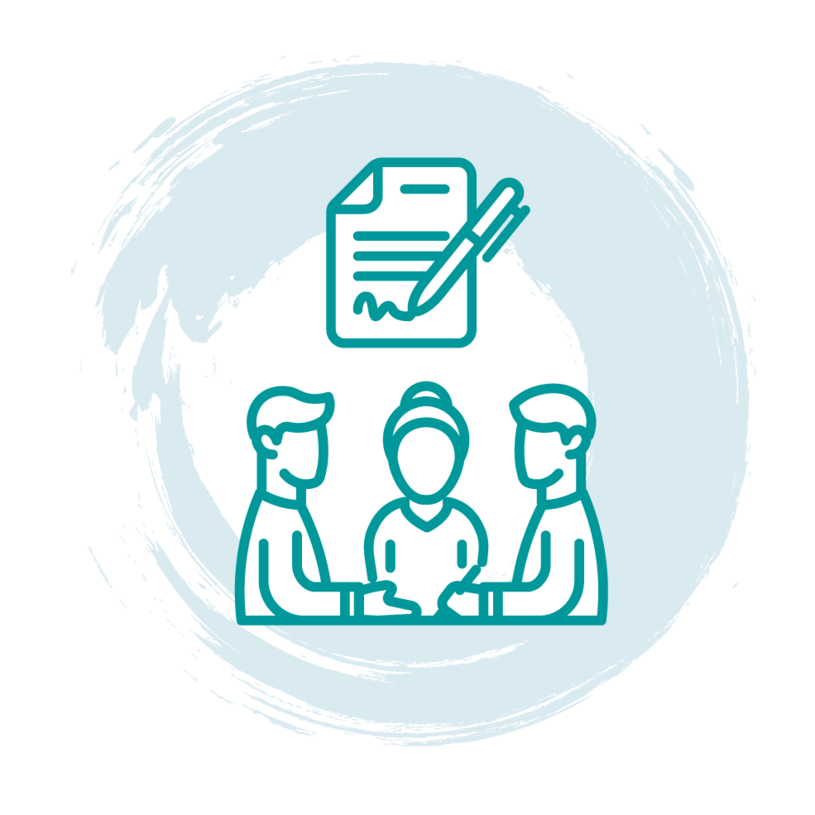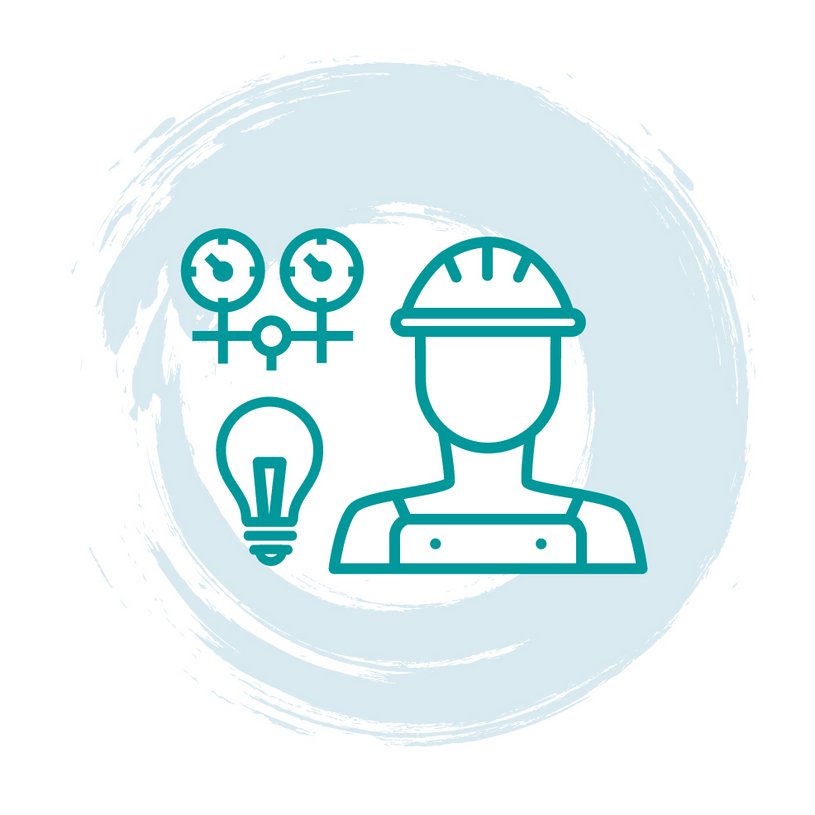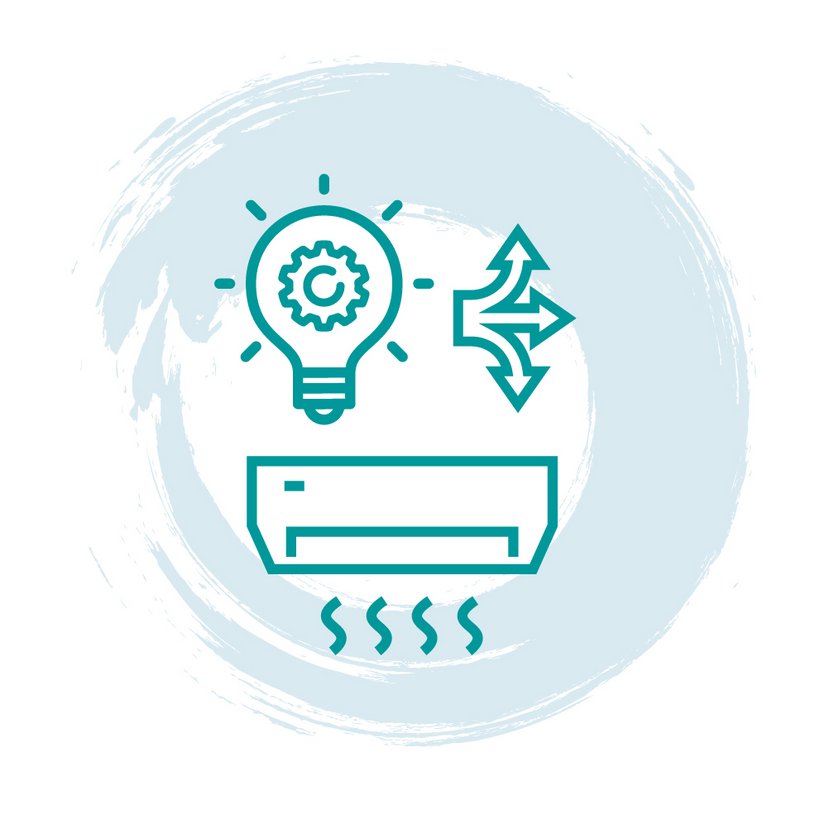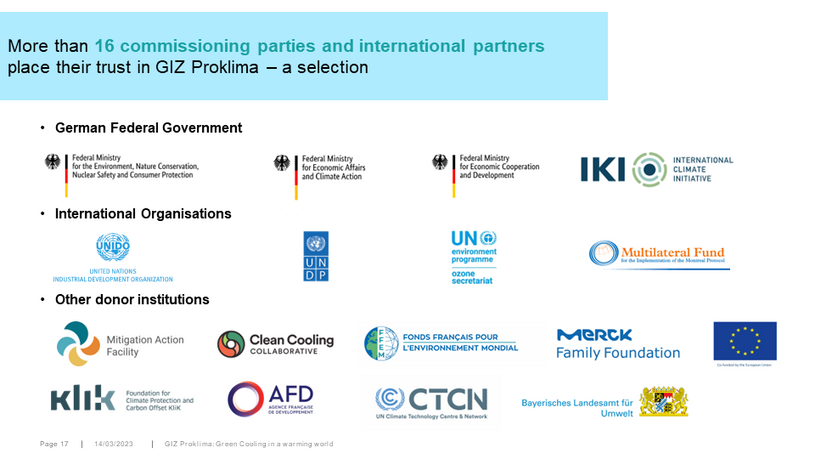About GIZ Proklima
Green Cooling technologies are available. They’re well known. So why aren’t we moving?
The year 2023 was the hottest year on record worldwide. Rising temperatures drive more demand for refrigeration and air conditioning, which in turn causes higher electricity use and carbon emission. GIZ Proklima is promoting Green Cooling around the globe to break this vicious cycle and make energy efficient, climate-friendly cooling with natural refrigerants accessible to all.
We are united on one goal: the transformation of the cooling sector – for the benefit of people, the environment, and our shared future.
GIZ Proklima is a project cluster focused on the promotion of Green Cooling, formed through a union of various projects and prestigious partners. Since 1995, we have implemented more than 340 projects in more than 60 Global South countries. The projects are funded by different donors, e.g. the German government or the European Union (see section "Our Commissioniers and Partners). They are implemented by the German Gesellschaft für internationale Zusammenarbeit (GIZ) GmbH (opens in a new window).
Our Projects
Click on our current projects and partner countries to find out more.
World map with project countries
legal disclaimer
Legal disclaimer
This geographical map is for informational purposes only and does not constitute recognition of international boundaries or regions; GIZ makes no claims concerning the validity, accuracy or completeness of the maps nor assumes any liability resulting from the use of the information therein.
Our services
Our work is based on three pillars: policy advice, technology transfer and capacity building. We advise politicians and governments in suitable framework conditions for a sustainable development of the sector. We support the technological transfer to Green Cooling and provide financing advice. We impart knowledge, build competencies and train experts.
Policy Advice

In the fields of climate, ozone and energy, we advise politicians and governments and advocate changes to the related framework conditions. This includes for example support in the establishment of national qualification, certification and registration schemes for RAC technicians in order to create a future-oriented workforce with expertise in Green Cooling. Within this process, we also participate in the elaboration of safety and health standards, as well as related norms and national laws.
Capacity Building (e.g. trainings)

We impart knowledge, build competencies and train experts in the application of Green Cooling technologies. One of our services in this area is our international training series "Cool Training", in which RAC trainers from all over the world are trained in the correct handling of natural refrigerants. In order to best integrate Green Cooling into existing curricula, we also work with educational institutions and RAC associations. Have a look at our section "Fit for Green Cooling"!
Technology Transfer

The best way to convince people of Green Cooling is by demonstrating new technologies and their real-life advantages. We evaluate the latest technological developments and devices and assist in their selection and adaptation. We accompany the process from the first idea to the actual transfer. To make a Green Cooling technology transfer possible, we also provide advice on possible financing schemes. (Example: Publication "Green Cooling in the Hotel Industry in Sri Lanka (opens in a new window)")
Our team
Our team is based around the globe, but mainly in Eschborn, Germany. Our expertise lies in the fields of environmental protection and international cooperation, with a background in material, industrial, chemical, electrical and mechanical engineering, as well as environmental science, city planning, economics, communications, microbiology and geoecology. Together, we aim for a cooler future for all.
Our Commissioners and Partners
Our work is supported and funded mainly by the German Government, in particular by the German Federal Ministry for Economic Cooperation and Development (BMZ), and the International Climate Initiative (IKI), but also by other donors. Through their generous support, we have advanced our mission to make climate-friendly and energy efficient cooling solutions accessible to all.

We cooperate with numerous partners to implement our work. Mostly, the National Ozone Units (NOUs) of our project countries, but also with companies and academic insitutions. Most of them are also members of our Green Cooling Network (opens in a new window).
IKI Complaint Mechanism
Some of our projects are funded by the International Climate Initiative (IKI) (opens in a new window). IKI has developed an independent Complaint Mechanism that aims to enable people to voice complaints and seek redress regarding social and/or environmental impacts of IKI projects or who wish to report misuse of funds.
The mechanism will contribute to the monitoring of projects' outcomes, prevent unintended negative effects of issues from going unnoticed, support the proper use of public funds, and finally ensure compliance with international good practices.



